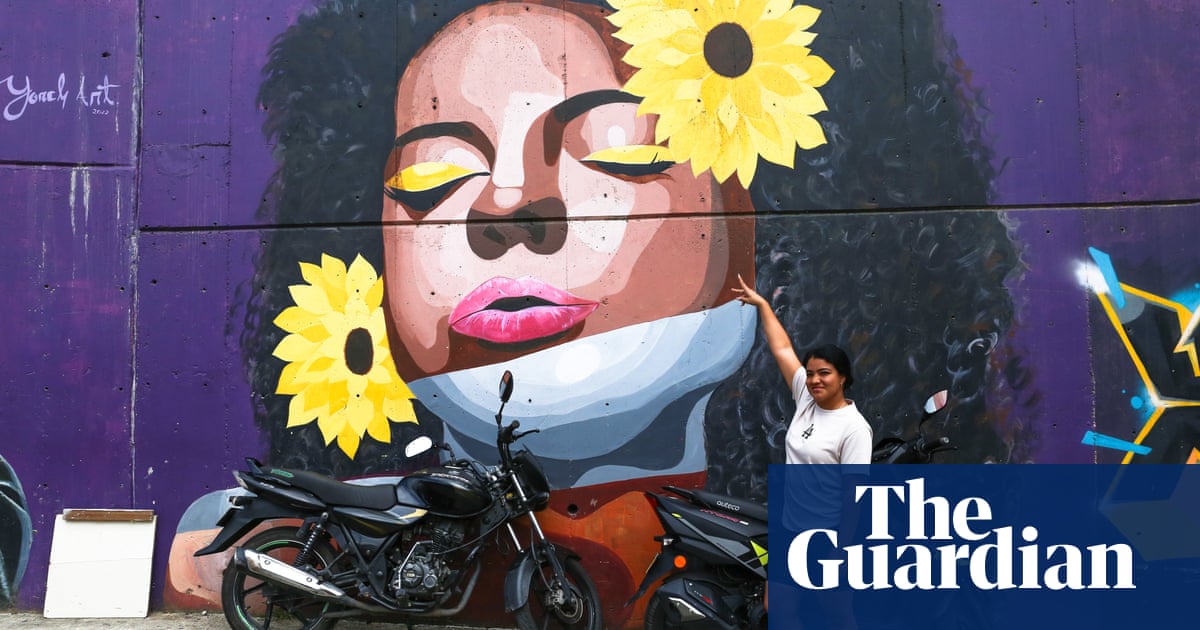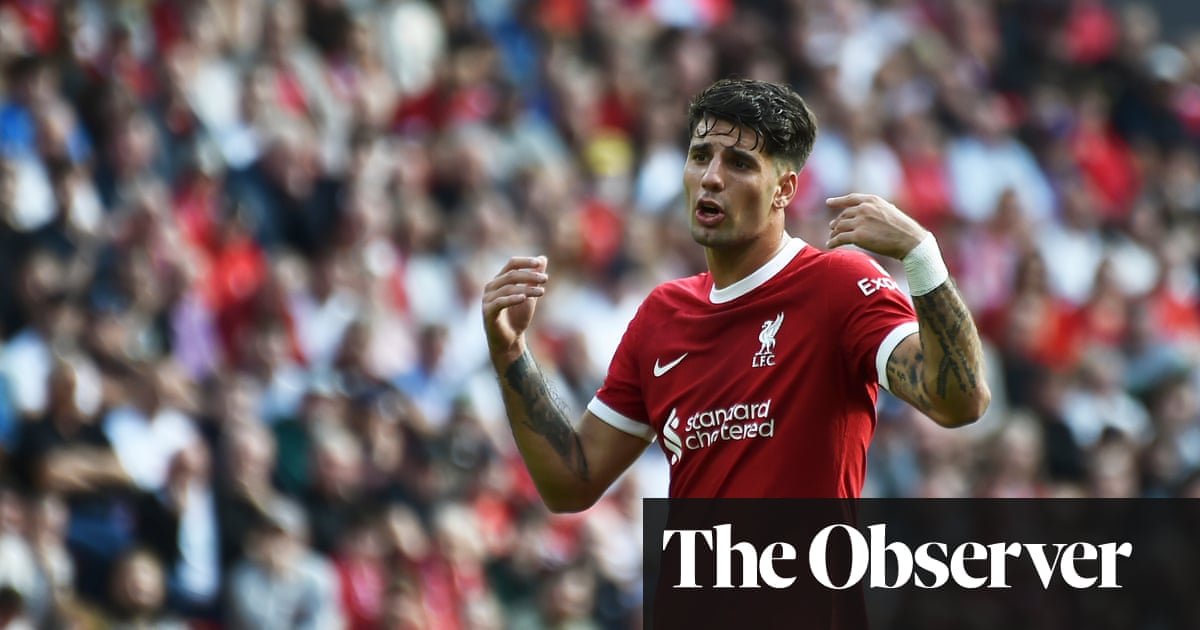
Dennis Junior Odunwo, AKA Tion Wayne, is a hard man to pin down. After a short wild-goose chase from our intended meeting point, we meet at a friend’s house in Lower Edmonton, London, where Odunwo has just finished getting his hair cut, to discuss his debut album, Green With Envy. Odunwo’s often menacing delivery on the mic contradicts his in-person demeanour; he’s polite and friendly, almost bashful. He’s still coming to grips with the vulnerable nature of interviews, he admits. “I’m not all the way there yet. I don’t really like giving away all of myself.”
Green With Envy is his first album, although the 28-year-old has long been an emergent star in the UK rap scene, first cropping up on YouTube in 2010 and gaining further hype with his Wayne’s World mixtape trilogy. His use of melody marks him out, with punchy staccato rhythms and sing-song delivery meshing perfectly with the hi-hats of drill. He has had a string of Top 10 hits including I Dunno – featuring guest stars Stormzy and Dutchavelli – and two catchy, cheeky tracks with Russ Millions: 2019’s Keisha & Becky and 2021’s Body. Each was further enhanced with posses on remixes, and the latter became the drill genre’s first No 1 in May (and won him two gongs at this week’s Rated awards). The disbelief still tickles him. “I was expecting it to take off, but not like that, no,” he laughs. “I don’t think anyone could anticipate that.”
Odunwo has been framed as a drill star ready to cross into the mainstream, but it would be wrong to pigeonhole him within that particular style. His cross-genre appeal is evident on his strong album, where tracks such as Loyal are laced with languid, Afro-swing rhythms, while Road to Riches excels at detailing struggles in the rap industry. His chart success comes from purposefully club-friendly and lighthearted singles, featuring one-liners designed, he says, “to be controversial” and get ears pricking. Body’s “you wanna get smoked, cigarette?” is brilliantly economical, both a diss and threat to an adversary; “I got blond girls coming to my shows / Even though their dad is a racist,” he raps on his latest Top 10 hit, Wid It.
“I was thinking: is this going to trigger anyone? And I thought: the only people this can trigger is racist people,” he laughs. “I’m not one of them rappers that every second puts on this persona [that] they’re some bad boy. Like, when I’m with the mandem and we’re licked [drunk], we’re all just dancing around. When I’m in a studio, I can put that vibe into my music.”
Being a bad boy, of course, is still a part of his image he’s having to contend with. Odunwo is the middle child of three. Though his parents were music fans, with his mother a lover of gospel, he was pushed towards accounting, banking and business. He summarises his relationship with his parents: “Conflict. It’s gone from conflict to understanding.”
That friction is detailed on Green With Envy with tracks such as Homecoming, where he talks of his strict Nigerian household and getting into trouble with the police in his younger years. He had been musically gifted and inclined to storytelling as a child, writing and emulating the flows of artists such as 2Pac that he would see on TV; his mother would take him to concerts (he vaguely recalls seeing Michael Jackson). But he had his first arrest at 15, and stints in prison culled his musical ambitions. It’s only now that Odunwo is starting to re-experience live music; a legacy of the police banning him from events such as Notting Hill carnival when he was in his early teens. “I got kicked out of my house bare times when I was young,” he notes. “Obviously, the vision [my parents] had for me, I weren’t really following it. I was out every day, wasn’t coming home and then I got caught up doing what I was doing.”
Was he a hothead growing up? “Yeah, I was a bit of a hothead,” he says slowly, toying with his answer. “But only when I thought me or my people would be at risk. I wouldn’t just snap for no reason.” It was the norm in Edmonton, he says, a deprived part of north London with few opportunities. “Everyone’s just on some survival mode ting. People judge you off the person you’re forced to be and that’s not the guy I’ve ever wanted to be. More people that grew up round here, they’ve just been changed into someone that they had to be.”
In 2017, he was charged with affray after being involved in a brawl outside a Bristol nightclub. He was filmed on CCTV kicking the victim in the head, and given a 16-month sentence. “I went from being someone to no one. The Bristol moment reminded me that I can’t be doing them kinds of things,” he says. “Back in the day I might have thought it was cool but now as I’ve grown up, it’s just dead – it’s not worth it. It was a reminder: I don’t want to be a nobody. But I’m just hoping that I’m not ever put in a position that can draw me out.
“People might look at me and think: ‘This guy’s a bad guy,’ but they ain’t been in the positions I’ve been in,” he continues. “You know when you’re backed into a corner? It’s like people who are in a war. It’s gonna bring out a side of them that’s not really them.” And in the Bristol case? Odunwo is regretful, but feels as though his sentencing is part of a wider issue, where pathways out of a dangerous lifestyle are blocked. “I feel like they made an example of me. I had like 14 co-defendants and I’m the only one that went [to] jail, because I was the headline,” he says.
“[Police] don’t want us to win, they want us to go to jail,” he continues, meaning people from his background. “That’s why they want the rapper so much; we’re the platform to the people they don’t like.” Fellow rappers J Hus, Headie One and Digga D have all been arrested and convicted after a first flush of fame, and he argues that “it can tear down a whole community” if its figurehead rapper is silenced, and that his friends “would be in jail” if he hadn’t been able to employ them in his music career. “There’s people that have been with me doing music and they haven’t been in trouble since. Take down a rapper, it takes down like 10 people. The police are making it a thing – they’re trying to take out the genre.”
His passion emphasises an often overlooked element of British rap: its nature as a community enterprise for people from his background. “It’s not for me any more, it’s for my people,” he says. “I feel like God sent me to be that guy. Because I’ve had so many messes-up on my way here, people have never actually deeped [realised] what I’m capable of. This is my first chance to show that in the eyes of the public.”
His eyes are also on superstardom. Odunwo wants to work again with the likes of Ed Sheeran – he helped keep Sheeran’s recent single Bad Habits at No 1 by creating a drill remix – and to serve as an entry point for British listeners who aren’t familiar with homegrown rap. “When rappers blow [up] in America they go straight into the mainstream, but I feel like there’s a big gap between the UK mainstream and the streets. Our country is more white. It’s harder to blow in this country as a black artist because there’s not a lot of us, you need all communities to listen. I’m trying to push the UK rap scene into a place where we’re recognised as mainstream music straight away, not ‘urban’.” A catalysing force who knows what it is to make change, he acknowledges that shift might be happening already.
Green With Envy is out now on Atlantic Records












